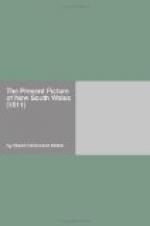The erection of a play-house was noticed in the preceding part of this sketch; the abuses which were uniformly committed on the nights of performance, subsequently rendered that a nuisance which was originally intended for an innocent recreation. When the inhabitants were engaged in this enjoyment, their property was left unwatched, and there were ever numbers of dishonest individuals who were ready to seize upon these opportunities to gratify their vicious dispositions. It was also a common practice to give provisions to obtain entrance, if money was scarce; and thus, by the frequent privations of their regular food, many of the convicts were unable to pursue their labour with proper energy and activity. Other abuses also resulted from the establishment of the theatre, which induced the governor to recal the permission which had been given for the performances, and the playhouse itself was soon afterwards levelled to the ground.
Since the destruction of this building, the sources of amusement have been confined to cricket, cards, water-parties, shooting, fishing, hunting the kangaroo, etc. or any other pleasures which can be derived from society where no public place is open for recreations of any description. The officers of the colony have also built a private billiard-room, by subscription, for their own use; and if these amusements possess not that degree of attraction which is attached to dramatic representations, they cannot, on the other hand, be liable to those abuses, and produce those injurious consequences, which previously existed.
Amongst the convicts, indeed, gaming is carried, too frequently, to the most deplorable excesses; and, in some cases, the most abandoned of the prisoners have actually staked the clothes which they wore, and when those were lost, stood amongst their companions in a state of nudity, thus reducing themselves to a level with the natives of the woods. The most severe measures were called for by this unprincipled practice, and the most gross part of the custom was done away; but it was impossible to put a total stop to the gratification of this gaming disposition, which is still pursued with equal avidity in some way or other, and which may be said, next to drinking, to constitute the chief pleasure and amusement of the lowest classes of the prisoners.
The amusements of the natives need no recital here, as they have been fully detailed in other publications.
Military Force.
The whole of the military in the colony consists of the New South Wales corps (now the 102d regiment), two volunteer associations, and a body-guard of troopers for the governor, commanded by a serjeant. In fact, the inutility of a larger military force must be obvious to every man of common reflection, since it is merely required for the purposes of preserving domestic peace, which might be in danger of continual interruptions, in case of the absence of military power




